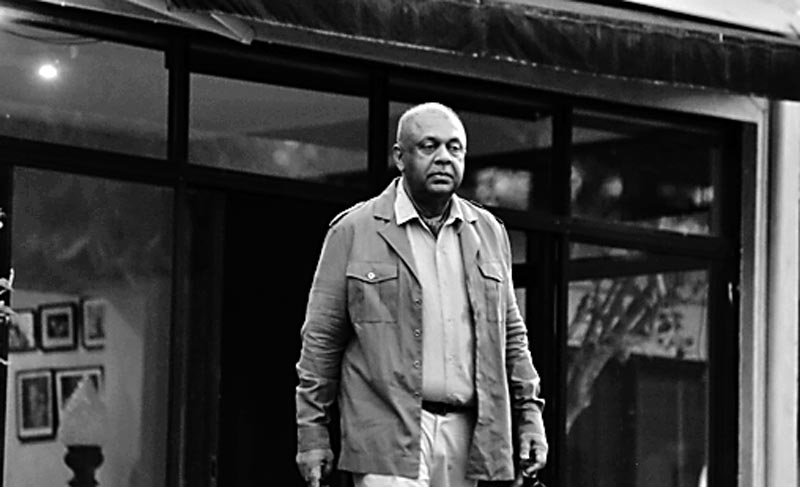Sunday Feb 15, 2026
Sunday Feb 15, 2026
Thursday, 25 November 2021 00:00 - - {{hitsCtrl.values.hits}}

Mangala Samaraweera
 Mangala Samaraweera was a remarkable public servant and one of the most remarkable individuals I have ever known. He was also a courageous leader, who dedicated his life to pursuing his vision for a multi-ethnic, multi-religious, and multi-lingual Sri Lanka that would, as he described it, “guarantee equal rights, justice and dignity for all.”
Mangala Samaraweera was a remarkable public servant and one of the most remarkable individuals I have ever known. He was also a courageous leader, who dedicated his life to pursuing his vision for a multi-ethnic, multi-religious, and multi-lingual Sri Lanka that would, as he described it, “guarantee equal rights, justice and dignity for all.”
I was devastated by Mangala’s passing, and these days find myself craving his wise counsel, irrepressible mischief, and rare gift for friendship. I also miss knowing that Mangala is out there hustling, refusing ever to give up on the idea that people could change for the better, that his country could realise his ideals, and that the world’s nations could think—and act—beyond their immediate self-interest.
The son of an open-hearted, trailblazing mother and a pioneering human rights lawyer father, the seeds of Mangala’s immense impact began as he witnessed the brutality of Sri Lanka’s civil war, with a simple thought: “Maybe I can make a difference.”
As Mangala would later recall, when he got involved in organising and politics in the late 1980s, “I dreamt mostly of peace where all Sri Lankans—irrespective of their caste, class, race or religion—could live in harmony and dignity.”
With this desire as his guiding light, Mangala would embark on over thirty years of service to his country, while using his growing influence to try to make this foundational dream a reality. While he took on a number of different roles throughout his career, Mangala was always trying to ensure that Sri Lankans were not only surviving daily life, but able to build lives of dignity. When I had the opportunity to visit Colombo in 2019 to celebrate Mangala’s legacy of public service, this was the word I heard over and over when I spoke to colleagues and peers about what they felt most defined Mangala: “Dignity, dignity, dignity.”
From helping launch the renowned Mothers’ Front to spearheading the creation of the Office of Missing Persons, helping secure passage of a law to provide for reparations for war victims and survivors, and orchestrating the forgiveness of loans taken out by desperate families after the war, the pursuit and promotion of individual dignity was perhaps the animating principle in Mangala’s career; but the best measure of Mangala’s regard for the dignity of those who lost their loved ones or their livelihoods was that he knew none of this was nearly enough.
Mangala once described true reconciliation as “a journey that requires constant striving.” He recognised that building a more inclusive society was a generational challenge that demanded sustained efforts and a willingness not to be deterred by the many visible obstacles that stood in the way. An indefatigable reformer and insistent moderniser, Mangala never wavered in his belief that democracy and strengthened institutions were the necessary foundations for achieving the change he hoped to see in Sri Lanka. This commitment earned him not just widespread recognition, but widespread respect—even from political rivals and those who disagreed with various decisions he made over time. Through it all, not even his political opponents could deny how much Mangala loved Sri Lanka and its people.
I experienced Mangala’s devotion to Sri Lanka not only in my many conversations with him when he described, with a poet’s precision, the country’s stunning scenic beauty—from majestic mountains like the ‘Sri Pada’, to the beaches of Unawatuna, as well as the vibrant celebrations that occurred on Poya days— but also as he incessantly texted me, after I became USAID administrator in April this year, in support of the Rajapaksa government’s effort to secure more COVID-19 vaccines. Watching the pandemic take Sri Lankan lives broke Mangala’s heart, and, even if he had stepped back a bit from public life, he couldn’t let an hour pass without trying to do something to “make a difference.”
Mangala would be the first to admit that the dream which started his career in public life has yet to be fully realised, but, in addition, to the progress he helped achieve on numerous fronts, his leadership, integrity, and ceaseless energy are a blueprint for new generations who share his commitment to equality and opposition to injustice.
As one Sri Lankan newspaper editorialised after his death: “To keep hope alive for a different future, citizens must demand political leadership that inspires, and dares them to dream of a kinder, more inclusive country. Someone to finish what Mangala started.”
That is our shared mission now. Without Mangala here to steer—and prod—us, we must do all we can to support the next generations following in Mangala’s footsteps as they seek to finish what he started.
Mangala never, ever gave up, and neither can we.
The writer currently serves in the Biden-Harris Administration as Administrator of the United States Agency for International Development. From 2013 to 2017, Power served in the Obama-Biden Administration as US Ambassador to the United Nations.